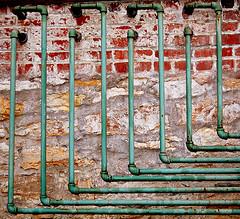 Polyvinyl chloride (PVC) is widely used in modern construction. PVC pipe is cheaper than polyethylene and polypropylene equivalents. Because of its hardness, PVC pipes can be used as large-diameter risers. One of the important advantages of PVC pipes is their ability to self-extinguishing in fire (due to the presence in the material of the chlorine atoms), which is an essential requirement for ensuring fire safety for sewer pipes. To this end, the production of polypropylene in the sewer pipe materials are special additives – flame retardants. However, PVC is considerably inferior to the polypropylene at a cost and convenience processing.
Polyvinyl chloride (PVC) is widely used in modern construction. PVC pipe is cheaper than polyethylene and polypropylene equivalents. Because of its hardness, PVC pipes can be used as large-diameter risers. One of the important advantages of PVC pipes is their ability to self-extinguishing in fire (due to the presence in the material of the chlorine atoms), which is an essential requirement for ensuring fire safety for sewer pipes. To this end, the production of polypropylene in the sewer pipe materials are special additives – flame retardants. However, PVC is considerably inferior to the polypropylene at a cost and convenience processing.
Distress it from an environmental point of view: a chlorinated plastic is a problem both in terms of its recycling and processing of industrial waste, in addition, the burning PVC liberates very harmful phosgene. Because of all this, strictly follows the safety of the environment in Western Europe, consumption and, consequently, the production of PVC is gradually shrinking. In addition, PVC is not has a high heat resistance. Therefore, PVC pipes are not welded and glued together with special glues or socket connection using a connection to the rubber seal. Attempts to improve the heat resistance of PVC due to the increase content in the chlorine from 57% to 65% in the final analysis, also cause limited use of this material, because namely the presence of chlorine in the PVC worrying environmentalists. One of the features of the design and installation pipeline – the need to integrate their devices and elongation compensators.
![Syndicate this site using RSS [x]](http://www.victoriabusinesstalk.com/wp-content/themes/mad-meg/images/rss.png)